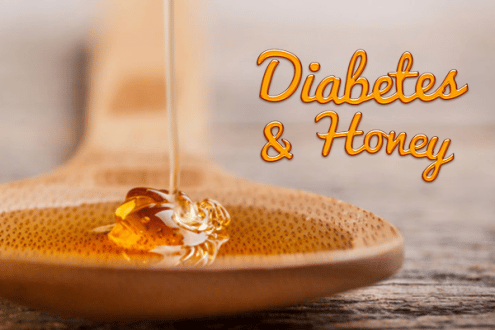It was a long held belief that individuals with Type 1 and Type 2 diabetes should avoid sugar altogether. Fortunately, this has been clinically disproven.
The key to managing high blood sugar levels is the strict adherence to a comprehensive plan that involves well-balanced diet and exercise, proper medications, and consistent blood glucose level monitoring.
Despite strict limitations, people with diabetes can consume food with reasonably low sugar content depending on their blood sugar level.
However, as the inherent harms of refined sugar become more exposed, a lot of people are now looking into healthier alternatives.
Honey stands out amongst the choices because aside from its taste, it is a natural sweetener proven to have many health benefits.
Honey Vs. Sugar
Honey is the rich, sweet, golden-colored syrup produced by bees through the cycle of repeatedly consuming, digesting, and regurgitating the nectars of flowers. They deposit the product in honeycomb cells which evaporate the moisture, thus creating the thick, smooth liquid known as honey.
Honey is 80% carbohydrate and 20% water, with the carbohydrates being a combination of glucose and fructose—both simple sugars. A 21g tablespoon of honey contains:
- 64 calories
- 25 g sugar
- 06g of proteins
- 04g of fiber
Honey also contains traces of various antioxidants, vitamins, and minerals such as potassium, calcium, zinc, and vitamin C which gives it its beneficial properties.
Meanwhile, a tablespoon of 21g of sugar contain almost 80g of calories and no nutrients. Between honey and sugar, the body breaks down honey easier. Honey is digested using enzymes already present in the honey, while sugar requires enzymes that the body has to create.
The biggest difference between refined sugar and honey is the glycemic index (GI). The glycemic index pertains to how quickly a carbohydrate can raise a person’s blood sugar levels. Honey has a GI of 58, while sugar has a GI of 60. The difference is not so significant since they are still—in essence— both sugars; but it is a scientific fact that table sugar raises blood glucose levels quicker than honey.
Honey and Diabetes
Honey is a natural sugar and carbohydrate; therefore, it will always naturally affect a person’s blood sugar level. However, compared to table sugar, it has a more minimal glycemic effect.
A study between the effects of honey and sugar on blood glucose levels of individuals with and without Type 2 Diabetes revealed that while both honey and sucrose caused an increase in the participants’ blood glucose level, those who took honey experienced a decline in blood sugar levels that remained low for two hours.
The same researchers conducted a similar study with adults with Type 1 Diabetes and it yielded the same results—the blood sugar levels of those who took honey decreased after sixty minutes and remained low.
These researches concluded that honey, unlike table sugar, may activate an increase in the body’s insulin production, which is the main substance responsible for regulating blood glucose levels.
Are there any harms to eating honey if one has diabetes?
The most crucial point is that honey is made up of glucose and fructose—carbohydrates that are in the form of sugars—and this will cause an increase in an individual’s blood glucose level.
For individuals with diabetes, honey must be consumed only under the correct circumstances—when the body’s glycemic levels are within the range low enough to allow for glucose to enter in the body.
With all its health advantages, honey is still naturally sweeter than sugar. If one chooses to substitute sugar with honey, the proportions must be significantly lower.
Another important consideration should be that the honey diabetics consume must be raw, natural honey only, as these do not have any hidden added sugars or preservatives. It should also contain all 200 natural healthy substances that occur in honey. The added sugars in processed honey will effect the blood glucose levels of a person unpredictably.
Are there any benefits to eating honey if one has diabetes?
Honey increases an individual’s insulin production after its consumption. Insulin is the main substance responsible for regulating an individual’s blood sugar levels.
Honey is rich in antioxidants, which boosts the body’s immunity by fighting harmful radicals in the body that might cause diseases. Several studies have also supported its potential to lower cholesterol levels.
Honey has vitamins and minerals which boost brain activity, suppress cough, soothe sore throats, and induce better, uninterrupted sleep.
Honey also has anti-inflammatory and anti-bacterial properties, which reduces diabetes complications and side effects.
Final Verdict
The wonders of honey have long been explored and proven by its countless uses in improving our general health. For individuals with Type 1 and Type 2 Diabetes, honey is the most suitable option to incorporate healthy sugar in a well-balanced diet.
However, honey must be consumed under a strict, highly monitored moderation to maintain the blood glucose levels within normal range. Honey is still a sugar, after all, and when the consumption is left unchecked it may cause more harm than good.
Consult with a healthcare professional before eating honey. Most importantly, always abide by the time-tested formula to regulate high blood sugar levels: eat healthy, exercise well, take prescription medications on-time, and constantly monitor blood glucose levels.
—
Disclaimer: Please note that the contents of this community article are strictly for informational purposes and should not be considered as medical advice. This article, and other community articles, are not written or reviewed for medical validity by Canadian Insulin or its staff. All views and opinions expressed by the contributing authors are not endorsed by Canadian Insulin. Always consult a medical professional for medical advice, diagnosis, and treatment.


